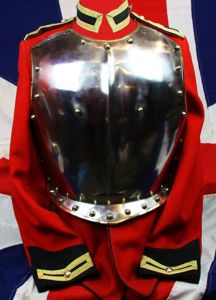
1 / 8
Original, Antique, Victorian Household Cavalry Armour Breastplate Cuirass of the LifeGuards, The Blues &The Royals. The Mounted Personal Bodyguard Regiments of the British Monarch, Part of The Household Division Crimean War Era
£1200.00
—
Description
With With brass edge trim & rivets. It bears the ordnance inspection stamps. Used by all of H.M.Queen Victoria's Household Cavalry regiments, the monarch's mounted bodyguard. It bears the original Victorian ordnance inspection stamps. Used by all of H.M.Queen Victoria's Household Cavalry regiments.Photographed against a background of an original 20th century Life Guards tunic in scarlet with gold trim.During a visit to the Tower several decades ago, thanks to an invitation by our friend Howard Blackmore {historian and assistant curator at the Tower} we had a discussion, amongst many other subjects, of the conversion of the Life Guards and Horseguards back to armoured heavy cavalry, after around 150 years of un-armoured service as the monarch's mounted guard since the 17th century.This is one of those early cuirass breast plates created for the newly armoured horse guards regiments.From 1661 to 1778, the Life Guards Troops saw action in the Jacobite Wars, the Second Dutch War(when they served as sailors) ant the War of the Austrian Succession. In 1778 the four HorseGuard Troops and Horse Grenadiers re-formed as the 1st Life Guards. Both Regiments foughtwith distinction in the Waterloo campaign.For the Egyptian War of 1882, Life Guards formed a Composite Household CavalryRegiment with the Royal Horse Guards, making Royal Horse Guards, making the famousmoonlight charge at Kassain. In 1894, for the relief of Khartoum, both Regiments contributedsoldiers to the Heavy Camel Regiment and were again formed as a Composite HouseholdCavalry Regiment for the 2nd Boer War in 1900The Royal Dragoons (1st Dragoons), initially known as The Tangier Horse, were raised byKing Charles II to form part of the garrison at Tangier, which had been acquired on hismarriage to Catherine of Braganza as part of her dowry. Known as The Royals, during the18th century the Regiment saw service in most of the same wars as The Blues, including thePeninsula campaign and Waterloo, where the Regiment famously captured the Eagle of theFrench 105th Infantry Regiment. However, in the 19th century, unlike The Blues, The Royalssaw service in the Crimea and in India.

